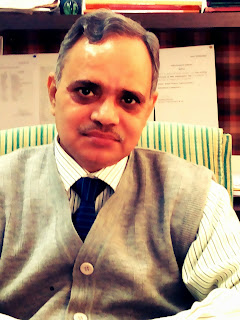Sankat Mochan Hanuman Temple is one of the sacred temples of Hindu god Hanuman in the city of Varanasi, Uttar Pradesh, India. It is situated by the Assi river, on the way to the Durga and New Vishwanath temples within the Banaras Hindu University campus. Sankat Mochan in Hindi means reliever from troubles.[citation needed] The current temple structure was built in early 1900s by the educationist and freedom fighter, Pandit Madan Mohan Malviya, the founder Banaras Hindu University. Hanuman Jayanti, the birthday of Hanuman, is celebrated in fanfare, during which a special shobha yatra, a procession starting from Durgakund adjacent to the historic Durga temple to Sankat Mochan, is carried out.
In the temple, offerings to Lord Hanuman (called Prasad) are sold like the special sweet "besan ke ladoo", which the devotees relish; and the idol is also decked with a pleasant marigold flower garland as well. This temple has the unique distinction of having Lord Hanuman facing his Lord, Rama, whom he worshiped with steadfast and selfless devotion.
It is believed that temple has been built on the very spot where Tulsidas had a vision of Hanuman. Sankat Mochan Temple was founded by Tulsidas who was the author of the Ramacharitamanasa, which is the Awadhi version of the Hindu epic Ramayana originally written by Valmiki. Tradition promises that regular visitors to the temple will gain special favor of Hanuman. Every Tuesday and Saturday thousands of people queue up in front of temple to offer prayers to Lord Hanuman. According to Vedic Astrology, Hanuman saves human beings from the anger of the planet Shani (Saturn), and people having an ill-placed Saturn in their horoscopes especially visit this temple for astrological remedies. This is supposed to be the most effective way for appeasing Shani. While it is suggested that Hanuman did not hesitate in engulfing in his mouth the sun, the lord of all planets, humbling all the gods and angel, making them worship him for Sun's release. Some astrologers believe that worshiping Hanuman can neutralize the ill-effect of Mangal (Mars) and practically any planet that has ill effect on human life.

















